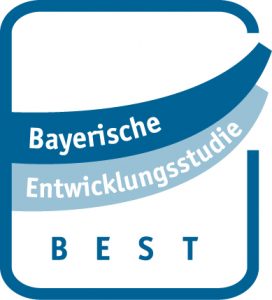Following our series about cohorts of the EU-funded project ‘Research on European Children and Adults born Preterm’ (RECAP preterm), we are delighted to give you an insight into The Bavarian Longitudinal Study (BLS)/Bayerische Entwicklungsstudie (BEST). It is led by Professor Dieter Wolke (University of Warwick, UK) and Professor Peter Bartmann (University Hospital Bonn, Germany). The BLS started off as a geographic whole population study of infants, who were born between January 1985 and March 1986 and admitted to neonatal special care in South Bavaria (Germany) within the first 10 days of life.

Phase I (1984-1990)
The study’s initial aims were : a) to document the prevalence of somatic and psychosocial outcomes of neonatal morbidity and early delivery in an unselected population of children in Germany; and b) to evaluate the impact of a regionalised neonatal service to the locally organised service provisions in Germany. For this purpose a geographically defined region in Finland was also studied and the same instruments were used (AYLS).
The study sample comprised all infants born during the period January 1985 and March 1986 who required admission to a neonatal unit within the first 10 days after birth. This geographically defined area (South Bavaria) recruited over 99% of children (N: 7,505 children; 10.6% of all births) that met the inclusion criteria (index sample). In addition, 916 healthy infants who were cared for on the normal postnatal wards in the obstetric hospitals were recruited as control infants. The Finnish population consisted of 1,536 index and 658 control infants.
Phase II (1990-1997)
To allow for a more intensive investigation, the study’s aims of a reduced sample were to assess the impact of biological and social risk on cognitive, social and behavioural development and academic achievement, intensive interviewing and observation on parental caretaking and psychopathology.
The cohort of Phase II of the study was a selected as part of the cohort of Phase I with following subsamples:
- Epidemiological sample (Very Preterm/Very Low Birth Weight): All children with GA <32 weeks or with birthweight <1500g;
- Quasi-experimental sample: Infants with GA>31 weeks. A quasi-experimental design was used.
Two assessments (1991-1994) were carried out at 6 and 8 years. In total N=1,543 children were assessed at 6 and 8 years.
Phase III (1997-1999) and Phase IV (2009-2015):
Two follow-up assessments in adolescence and adulthood focussed on the highest risk group (VP/VLBW) of the original sample only and a control group of full term born adolescents/adults followed since birth.
The study objective of the assessment in adolescence was the development of school achievement, behaviour and self-esteem. The study’s aim of the adult assessment was the identification of protective and resiliency factors in the development of children exposed to biological or environmental adversity. The study focused on neuronal, neuro-cognitive and behavioural development, health utility, and quality of life from infancy to adulthood.
One assessment each was carried out at 13 years (1998-1999) and at 26 years (2010-2014). The samples comprised N=671 and N=489, respectively.
The BLS cohort is governed by Professor Dieter Wolke (University of Warwick, UK) and Professor Peter Bartmann (University Hospital Bonn, Germany). The data are held at Warwick and the assigned data manager is Nicole Baumann (N.Baumann.1@warwick.ac.uk).
Please note:The RECAP preterm project has received funding from the European Union’s Horizon 2020 research and innovation programme under grant agreement No 733280.


